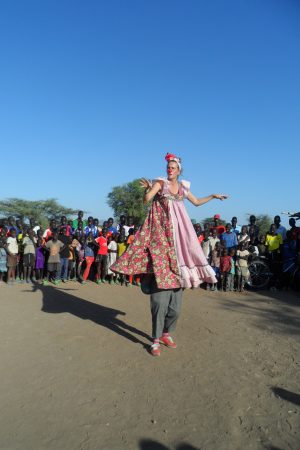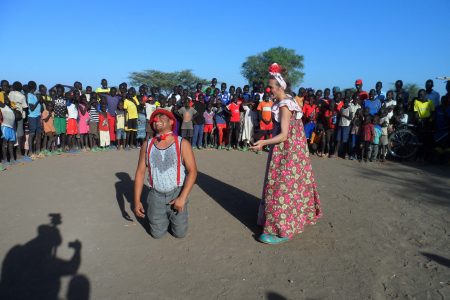By Tolasa Shome and Qaabata Boru
Clowns Without Borders bring joy to Kakuma children
Clowns Without Borders – CWB in the USA – is a non-profit organization, which offers laughter to relieve the suffering of people in crisis. CWB USA has worked in more than 30 countries. In 2016, the organization served at least 26,180 people with a budget of $165,000. Despite the limited funding, the Clowns’ aim is to relieve the suffering of everyone, especially children who live in areas of crisis including refugee camps or conflict zones, thus advocating for resilience in laughter.
In 2016, CWB conducted workshops on circus arts and physical theatre for children and youths in Kakuma. In the course of 17 days in August and September, CWB offered 12 shows and 13 workshops reaching out to over 5,000 children and adults including the members of the host community. The volunteers engage about 200-300 children at a single show and involve them in different activities like juggling, jokes and some form of magic.
KANERE met a group of four members of CWB while they were busy bringing fun and enhancing play with children at Fuji primary school at Kakuma two, a section in Kakuma refugee camp. The shows are energised with vibrant laughter and happiness, with skilled actors performing in turns.
According to Henrik, a team leader from CWB, “The Clowns are people that make people laugh and they give shows and performances all over the world. The Clowns travelled to places like El Salvador, Kakuma, Haiti, earthquake sites like Ecuador, Lebanon and many places in the world where children especially are suffering high levels of stress and trauma. In such situations it is very important to provide laughter and this forms a kind of therapy.”

The Clown volunteers did workshops in four different parts of Kakuma one, two, three and four. “Each day we do a daily show at different places all over Kakuma and we will deliver laughs and we love to see people laugh.” Gabi Winter, an actress, told the KANERE reporter at camp 3.
“We faced a challenge with languages and we use body language to make children laugh.” she added.
The Clowns intended to have a show for adults, but the shows in these sessions are meant for children.
This is the second time for the CWB team to perform in Kakuma since 2015. The team have a plan to continue working with UNHCR in Kakuma where artistic therapy is limited and refugees continue to live in limbo for over 25 years.
Kakuma has been in existence since 1991, and it is currently a home to about 200,000 people who have fled violent conflict and wars in the neighbouring countries.
In such a protracted situation refugees feel they are just numbers waiting for year and years to be processed without any influence over their future.
The Clowns’ work is welcomed by KANERE towards building a partnership as a refugee media as well as embracing the will of the camp residents themselves, of whom thousands of their audience are largely school-going children and youths.

On a particular show held in Kakuma two, one of the audience told KANERE that this laughter is important in uplifting their spirits as they return to their dwellings in the camp after sunset. “I feel happy to attend the shows and it boosts the amount of sleep, it feels happy in my mind,” Shukria, a young Somali woman remarked.
In Kakuma, theatre workshops provide creative exercises that help children learn to work and play together. Performances in the community can often bring together previously segregated groups while providing a safe setting where everyone can laugh together.
“The amazing thing with the physical comedy is that you can reach people across language barriers. I still have images of laughing audiences flashing across my eyes when I go to sleep.” Henrik Bothe told KANERE in an interview
In protracted camp situations where children are growing up and adults are growing old, with no livelihoods and limited opportunities to change life for the better, some form of therapy is often essential.
The Clown volunteers are expected to return to Kakuma once a year.
